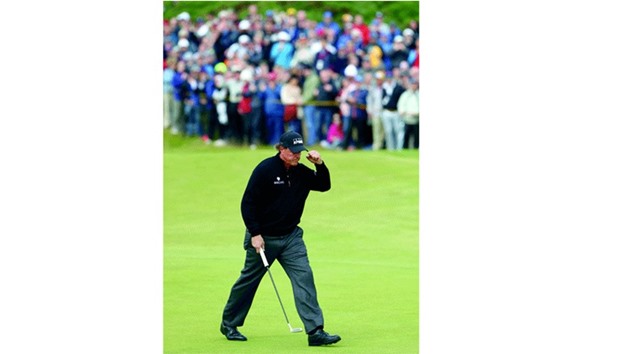As Lefty and the Ice Man duelled their way up the 18th at Royal Troon and basked in the acclaim of the grandstand on Saturday evening, BBC 5 Live’s Jay Townsend was in lyrical mood. “This is the pinnacle of the game. This is the Open Championship, the biggest tournament in the world. There is no equal,” he whispered as Phil Mickelson and Henrik Stenson set themselves up for an epic final-day joust.
And there is the rub for those continuing to rake over the shambolic reintroduction of golf to the Olympics after 112 years away. If Olympic gold should represent the pinnacle of sport, each major that slips by is a reminder that for golf it will always be very much an afterthought.
The International Olympic Committee has got away with football’s under-23 fudge and tennis retains an uncomfortable position, but the parade of top male golfers turning their backs on Rio has thrust wider issues into the light. For a Games facing a perfect storm of problems, from corrosive ennui over doping and corruption to concerns over tickets and transport, it is the last thing organisers needed.
On top of everything else, they now have to defend the expense of building a golf course for a competition that no one wants – least of all those most likely to win it. Forget letting them eat cake, instead let them build golf courses. Zika has given golfers, and an increasing number of tennis players, the cover they had perhaps been looking for to make the decision not to travel to Rio that bit easier.
Although not among the first wave of deserters, Rory McIlroy and Jordan Spieth – the young bucks whom the sport’s marketeers prayed would fill the gap left behind by Tiger Woods – dealt the cruelest blow. McIlroy then twisted the knife by flippantly suggesting that he would instead watch “the stuff that matters” rather than his own sport. It is hard to castigate McIlroy for his honesty. It is no more than the IOC deserves.
You could take the view that this is all a bit of a sideshow; it matters little that a sport that should not have been reintroduced to the roster in the first place is derailing its own Olympic ambitions. You could, with some justification, argue we should focus on the women’s golf competition and the attendant boost in profile it will provide. But this furore matters because it is just the latest example of the fraying of the thread that still – despite everything – gives the Olympics its allure.
That appeal that has been ruthlessly and successfully mined since the commercial resurrection of the Games in Los Angeles in 1984. It relies on a kind of a trick of the light. By aggregating the efforts of thousands of under-appreciated athletes from around the world every four years at the peak moment of their careers, almost all other sins can be forgiven. All those hundreds of thousands of hours of blood, sweat and tears are woven into a tapestry of compelling human endeavour that is distilled into a fortnight that retains the power to thrill, move and inspire.
Even as news continued to drip through of the world’s top golfers delivering death by a thousand cuts to its Olympic status, I spent a morning at Bisham Abbey with Britain’s women’s rugby sevens squad – the other sport added to the programme at the same time as golf in 2009. They have spent three years focusing on Rio and little else – try telling them Olympic gold is a mere bauble. It is that intangible appeal that leads to overblown claims being made on the Olympics’ behalf. So it is that the IOC president, Thomas Bach, has pompously claimed the Games will somehow pour balm on Brazil’s open wounds at a time of economic, political and social turmoil. So it is that those behind the awe-inspiring transformation of the British Olympic team into a ruthless medal-winning machine made the bold claim last week that success in Rio could help bridge the divide at the heart of a nation split in two by Brexit.
Yet the IOC, in being lured by the dollar just a bit too conspicuously and being called out on its hubris, risks fraying that thread just a little more. Greedily eyeing golf and its corporate backers, its members fell over themselves to add it to the schedule when others – not least squash – blatantly had a better case.
It is the same self-aggrandising strand that leads it to preach sustainability and legacy in choosing host cities yet ultimately proves unable to resist the siren call of scale and spectacle when offered the choice.
That has convinced it that investing a fortune in an “Olympic Channel” is the way to reach the youth of the world, even as the average age of those watching the Games creeps upwards. And that led it to follow up its mistake in ushering in golf by lurching wildly the other way, allowing Tokyo 2020 to introduce five new youth-friendly sports – skateboarding, surfing, mountaineering, baseball and karate – in a move that smacks of a drunk dad grooving at a wedding.
In doing so it threatens to undermine not only what makes the Olympics sellable but what still makes it special. And it risks bringing just a little closer the day when the five rings offend rather than inspire.

Phil Mickelson of the US reacts after saving par on the 12th hole during the final round of the British Open at Royal Troon, Scotland, yesterday. Mickelson finished runner-up to Swede Henrik Stenson by a three-shot margin.
